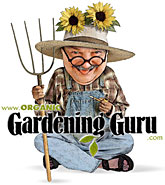Yvonne Kimm lives surrounded by potato fields and potato farmers. A native of Manitoba, she married a potato farmer who’s the son, grandson, and brother of potato farmers.
So what did Yvonne do? She became a potato farmer. With a difference: she became an organic potato farmer and one of a handful of certified organic seed potato producers in Montana. I interviewed her at her farm, ten or fifteen miles west of my town Bozeman; you can listen to or download the show, No Small Potatoes, by following that link, or by navigating from the webtalkradio.net. logo in the right sidebar.Yvonne’s organic farm is a fairly small operation, about two acres, but enough to grow six different varieties that let her supply organic stores and restaurants here in Bozeman from late July or August through the winter and into early spring.
It began as a testing ground to see whether and how Jason and Yvonne could grow the potatoes on their huge conventional fields using fewer chemicals. The experiment, highly dependent on compost tea, was a success, leading to major changes on the big farm and to the independent organic operation, which Yvonne runs
After showing me the organic fields, Yvonne gave me a tour of the farm—a real eye-opener to this city kid. Sorting sheds, washing operation, storage sheds, and the sorting process itself, complete with a couple of friends on the line.
The original plan had been to spend twenty minutes or so with her and then drive out to the field to interview her husband Jason over the lunch break. But when we got to the field, all the big machines had stopped before reaching the end of the row, and it was forty minutes before they got going again.
At this point, something happened that didn’t make it into the show: When we did meet up, Yvonne didn’t task Jason with a bunch of questions (the way I would have, in her position.) Not because she didn’t want to know what had happened, but because other things came first. Jason was trying to get to another field to test the moisture content to see if it was ready to harvest; he was trying to accommodate my request for an interview; and Yvonne did nothing to hold him up.
The same thing happened at the end of my interview with Jason, which is part of the next show. Just as we reached the end of a row, Jason saw that something was wrong on the harvester his father was driving, and he had to get over there to fix it. Yvonne, who was waiting for me in the car, said hi, bye, and let him go.
In another setting, with different people, the fact that a woman doesn’t ask a single question of her husband could be evidence that she’s downtrodden, repressed, even afraid. Now, I only met these people once, but that idea is so ludicrous it makes me laugh. Just listen to Yvonne’s voice, and I suspect you’ll agree. And if you hear her story of hand digging 900 pounds of potatoes one rainy week, the image of a weak or shrinking woman is dead on arrival.
So the fact that she didn’t ask, immediately, the question she’d asked several times while we were watching in the car, “What’s going on out there?” shows, rather, a remarkable self-confidence, and a sort of courtesy and restraint. She could hold her questions until evening. These people co-operate in a major enterprise, and their individual curiosity takes a back seat to getting the job done.

 Subscribe to RSS feed
Subscribe to RSS feed


